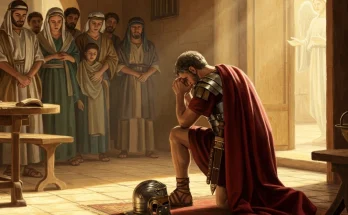- Writer of the Book of First Corinthians
- Date Written
- To Whom Written
- Purpose of the Book of First Corinthians
- Historical Context of the Book of First Corinthians
- Key Themes in the Book of First Corinthians
- Major Events/Stories
- Theological Contributions
- Special Consideration in the Book of First Corinthians
- Book of First Corinthians Conclusion
- Frequently Asked Questions (FAQ) About the Book of First Corinthians
Have you ever wondered why unity is so challenging, even among believers? The Book of First Corinthians tackles this exact question. Written by the Apostle Paul, this letter addresses some tough issues in the Corinthian church—things like division, immorality, and misunderstandings about worship and spiritual gifts. As we dive into Paul’s words, we see his strong desire to bring the church together under a common goal: living a life that reflects Christ.
Paul’s heartfelt message challenges us to examine our own lives. Are we contributing to unity or creating division? In a church facing conflicts and confusion, the Apostle Paul reminds the Corinthians that they’re part of one body, called to love and serve together. Through this outline, we’ll explore Paul’s teachings, which aim to guide us in leading a faithful, united life, even in today’s complex world.
Let’s take a journey through First Corinthians and see how Paul’s advice resonates in our lives, calling us to pursue unity and authentic Christian living.
Writer of the Book of First Corinthians
The Book of First Corinthians was written by the Apostle Paul, one of the most influential figures in early Christianity. Paul, originally known as Saul, was a devout Jew and fierce opponent of Christianity until a dramatic encounter with Jesus on the road to Damascus transformed his life. Following his conversion, Paul dedicated himself to spreading the gospel across the Roman Empire, enduring trials and hardships to establish and strengthen churches.
Paul’s relationship with the Corinthians was especially meaningful. During his second missionary journey, Paul spent 18 months in Corinth, a bustling city known for its wealth and immorality. While there, he founded a church and taught the new believers, helping them navigate the challenges of living out their faith in a morally complex culture.
Paul’s first letter to the Corinthians addresses problems he heard were affecting the church after his departure, such as divisions, immorality, and confusion about spiritual gifts. His goal was to guide them toward unity and a lifestyle that truly reflected Christ’s teachings. Through the Book of First Corinthians, Paul’s wisdom and concern for the church are clear, offering timeless insights for believers today.
Date Written
The Book of First Corinthians was likely written around AD 53–55 during the Apostle Paul‘s stay in Ephesus on his third missionary journey. Ephesus, a major city in Asia Minor, served as a key center for Paul’s ministry and correspondence. While there, Paul received troubling reports from Corinth about issues within the church he had established. These reports, combined with questions sent from the Corinthians themselves, prompted Paul to write this first letter to address their concerns and provide guidance.
Paul’s time in Ephesus allowed him to focus on teaching and addressing the needs of churches he had planted, including the one in Corinth. He crafted First Corinthians not only to correct misbehavior and misunderstandings but also to unify the church amidst cultural challenges. Corinth, known for its wealth, pagan worship, and immorality, posed unique difficulties for early Christians. By writing to them from Ephesus, Paul encouraged believers to remain faithful and live according to Christ’s teachings despite external pressures.
Understanding the context and timing of the Book of First Corinthians gives us valuable insight into Paul’s urgency and pastoral care, as he guided a young church through significant challenges.
To Whom Written
The Book of First Corinthians was addressed to the church in Corinth, a lively and diverse community of believers in a major city of the ancient world. Corinth was a prosperous and influential center known for its bustling trade, strategic location, and cultural diversity. Located on an isthmus between the Aegean and Ionian seas, Corinth attracted people from all over the Roman Empire, making it a melting pot of cultures, beliefs, and social classes.
This vibrant mix also brought significant challenges. Corinth was infamous for its moral laxity and devotion to pagan practices, including idol worship in its numerous temples. Many of the city’s practices conflicted with Christian values, creating tension for the believers there. The Corinthian church itself was made up of individuals from various backgrounds, including Jews, Greeks, and Romans, each bringing unique perspectives that sometimes led to misunderstandings and divisions.
In writing First Corinthians, Paul sought to address issues arising from this mix of influences. His goal was to help the church members live out their faith in a way that set them apart from the surrounding culture, uniting them as one body in Christ. His letter speaks directly to the challenges of living as a Christian in a complex and often hostile world.
Purpose of the Book of First Corinthians
The Book of First Corinthians was written to address significant issues that had arisen within the Corinthian church. Paul received reports of divisions among the believers, instances of immorality, and disorder during gatherings, all of which were compromising the church’s unity and witness. This letter aimed to correct these problems, reinforcing the teachings Paul had shared during his time in Corinth.
One of Paul’s primary goals was to bring clarity to Christian doctrine and encourage the believers toward spiritual growth. The Corinthian church was struggling with questions about marriage, food sacrificed to idols, and the proper use of spiritual gifts, often causing confusion and conflict among its members. Paul provided detailed guidance on each issue, emphasizing the importance of love and unity within the body of Christ.
Beyond addressing immediate concerns, the Book of First Corinthians served to remind the church of its calling to reflect Christ’s love and holiness to the world. Paul’s teachings encouraged the Corinthians to grow in maturity, to use their gifts responsibly, and to focus on the central message of the gospel. His letter continues to offer timeless wisdom for believers today, calling us to pursue unity and spiritual integrity in our own communities.
Historical Context of the Book of First Corinthians
The Book of First Corinthians was written against the backdrop of Corinth, a bustling and influential Greek city with a unique blend of Jewish, Greek, and Roman culture. Located on a narrow isthmus, Corinth was a major commercial hub, attracting traders, travelers, and settlers from across the Roman Empire. This diverse environment brought various religious and cultural practices, many of which conflicted with Christian values.
One of the primary challenges facing the Corinthian church was the city’s rampant idol worship. Temples dedicated to Greek and Roman gods dotted the landscape, and idol worship was interwoven into daily life. This posed a dilemma for the new believers, especially when it came to issues like eating food offered to idols. Additionally, Corinth’s reputation for sexual immorality presented a direct challenge to Christian teachings on purity. The city’s temple of Aphrodite, known for its practices involving ritual prostitution, exemplified the moral laxity that Christians were called to reject.
Social stratification also complicated the church’s efforts to live as one unified body. Corinth’s diverse population included the wealthy and powerful alongside slaves and the poor, leading to issues of pride and division within the church. The Book of First Corinthians addresses these cultural challenges, calling the believers to a higher standard of unity and holiness.
Key Themes in the Book of First Corinthians
The Book of First Corinthians covers several key themes that are crucial for understanding Christian life and unity. Paul’s letter to the Corinthians addresses issues that arise within a diverse community and offers guidance on living faithfully in a complex world.
Unity in the Body of Christ
A central theme in the Book of First Corinthians is the importance of unity within the church. The Corinthians faced internal divisions based on personal loyalties to different leaders, such as Paul, Apollos, and Cephas (Peter). Paul emphasizes that Jesus Christ is the foundation of the church, and believers are called to work together as one body. He uses the metaphor of the body to illustrate how each member, with unique gifts, contributes to the whole. This unity is crucial for the church’s witness and spiritual growth.
Christian Conduct and Ethics
Another major theme is the call to live according to Christian ethics. Corinth’s cultural environment was morally lax, filled with idol worship and sexual immorality. Paul instructs the Corinthians to live in a way that honors God, contrasting the purity of Christian life with the surrounding culture’s practices. From addressing issues like lawsuits among believers to moral conduct in personal relationships, Paul’s guidance seeks to align their actions with their faith in Christ.
The Role of Love in Spiritual Gifts
In First Corinthians, Paul also addresses the proper use of spiritual gifts within the church. The Corinthians were misusing their gifts, which led to competition and pride. In response, Paul highlights love as the essential foundation for all spiritual gifts, famously outlined in 1 Corinthians 13, often called the “love chapter.” Without love, he argues, spiritual gifts are meaningless. Love unifies and strengthens the community, enabling believers to serve one another genuinely.
Resurrection and Eternal Hope
The theme of resurrection is central to the Book of First Corinthians, especially in chapter 15. Paul reaffirms the hope of resurrection, clarifying its importance to the gospel and believers’ faith. The resurrection is not only a future promise but also a source of present strength, encouraging Christians to live with purpose and hope, knowing they are destined for eternal life with Christ.
In the Book of First Corinthians, Paul’s teachings on unity, love, and resurrection provide a framework for a faithful Christian life and for the church’s witness in the world.
Major Events/Stories
The Book of First Corinthians covers various significant events and issues that arose in the Corinthian church, each revealing critical aspects of Christian life and community. Paul’s responses to these matters provide timeless guidance for believers.
Addressing Divisions and Factions (Chapters 1–4)
Early in the Book of First Corinthians, Paul tackles the problem of divisions within the church. Some members claimed allegiance to specific leaders—Paul, Apollos, Cephas (Peter), or Christ—causing factionalism. Paul reminds the Corinthians that Christ is the true foundation of their faith, and no leader should divide them. He emphasizes unity in the body of Christ, explaining that each leader serves under God’s guidance to build the church as a single, united body.
Issues of Immorality and Church Discipline (Chapters 5–6)
Paul next addresses cases of immorality that were harming the church’s witness. One particularly serious incident involved a man in an inappropriate relationship with his stepmother. Paul instructs the church to practice discipline by distancing from unrepentant members who engage in immoral behavior. He also warns against lawsuits among believers, urging them to resolve disputes within the community rather than resorting to public courts, which could damage the church’s reputation.
Marriage and Singleness (Chapter 7)
In Chapter 7, Paul provides guidance on marriage and singleness, addressing specific questions the Corinthians had sent to him. He acknowledges the value of both marriage and singleness, encouraging believers to live in a way that honors God. He advises married couples to stay together and singles to focus on serving God, while also giving practical advice for those facing marital difficulties. This chapter promotes honoring God in every relationship status.
Spiritual Gifts and the Importance of Love (Chapters 12–13)
Paul discusses the diversity of spiritual gifts in Chapters 12 and 13, urging the Corinthians to use their gifts to benefit the whole church. He explains that all gifts come from the same Spirit and should work in harmony. In Chapter 13, Paul underscores that love is the foundation of all spiritual gifts, stressing that without love, even the most spectacular gifts are meaningless.
Teachings on the Resurrection (Chapter 15)
One of the most crucial teachings in First Corinthians is on the resurrection, which Paul covers in Chapter 15. Some Corinthians doubted the resurrection of the dead, so Paul reinforces the foundational belief that Christ rose from the dead, securing eternal life for all believers. This chapter serves as a powerful reminder of the hope and purpose Christians have in the resurrection.
These major events in the Book of First Corinthians address essential areas of faith, unity, and ethical living within the church, making Paul’s teachings relevant to believers today.
Theological Contributions
The Book of First Corinthians offers foundational theological insights for understanding the Christian life and the Church’s role in the world. One of its key contributions is the concept of the Church as a unified body with diverse members. Paul uses the metaphor of the body to illustrate that each believer, regardless of their unique gifts, plays a vital role. This unity in diversity strengthens the church and demonstrates the power of working together in Christ.
Another essential theological contribution is Paul’s teaching on the resurrection. In Chapter 15, Paul explains that Christ’s resurrection is central to the Christian faith, providing believers with hope for eternal life. The resurrection assures Christians of victory over death and reinforces the purpose and direction of their faith.
The Book of First Corinthians also emphasizes love as the cornerstone of Christian life and ministry. In the famous “love chapter” (1 Corinthians 13), Paul explains that without love, spiritual gifts and achievements are meaningless. Love should guide every action, binding the community together and reflecting God’s character to the world. Through these theological contributions, First Corinthians provides enduring principles for unity, hope, and love in Christian life and worship.
Special Consideration in the Book of First Corinthians
In the Book of First Corinthians, Paul takes a unique approach by directly addressing specific problems and questions within the Corinthian church. His letter responds to both reports he received about issues in the church and questions the Corinthians themselves asked him. This tailored response makes First Corinthians highly practical, as Paul offers direct solutions and teachings on unity, morality, marriage, spiritual gifts, and resurrection. His method shows pastoral care, as he focuses on guiding the church toward faithful living amidst real-world challenges.
An important consideration when studying First Corinthians is understanding the cultural context of Corinth. Corinth was a cosmopolitan city with diverse beliefs, rampant immorality, and idol worship, all of which influenced the behaviors and challenges of the church members. Paul’s teachings, such as his advice on food offered to idols or proper worship conduct, are closely tied to this cultural backdrop. Recognizing this helps us discern which instructions were meant for Corinth’s unique circumstances and which are timeless principles for all believers. The cultural lens of First Corinthians provides valuable insights into how we can faithfully apply Paul’s teachings in our own diverse and complex societies today.
Book of First Corinthians Conclusion
The Book of First Corinthians is a powerful guide to understanding the Christian life within the church. Through this letter, Paul’s key messages of unity, love, and the hope of resurrection offer a framework for believers to navigate both personal and communal challenges. He calls the church to function as one body, united by diverse gifts, with love as the foundation of all relationships and actions. Without love, Paul explains, even the most impressive spiritual gifts fall flat. Additionally, his teaching on the resurrection reminds believers of their eternal hope and purpose, giving strength and direction to their faith.
The Book of First Corinthians continues to speak to us today. Paul’s teachings invite modern Christians to examine our own churches and lives, asking if we reflect the unity, love, and hope he urged the Corinthians to embrace. In a world often divided and morally complex, Paul’s advice provides a roadmap for living in a way that honors God and builds up the church. Applying these timeless principles helps us grow in faith and community, bringing the message of Christ to life for those around us.
Frequently Asked Questions (FAQ) About the Book of First Corinthians
What is the main purpose of the Book of First Corinthians? The main purpose of First Corinthians is to address issues within the Corinthian church, such as divisions, immorality, and confusion about spiritual matters. Paul wrote to guide the church toward unity, ethical living, and a stronger understanding of foundational Christian beliefs.
Who was Paul writing to in First Corinthians? Paul addressed this letter to the Christian church in Corinth, a diverse and influential congregation in a city known for its wealth, idolatry, and moral challenges. The church included people from various cultural backgrounds, which sometimes led to misunderstandings and conflicts.
What are the major themes in First Corinthians? The key themes include unity in the body of Christ, Christian conduct and ethics, the importance of love in spiritual gifts, and the hope of resurrection. These themes address practical and theological aspects of Christian life and community.
Why does Paul emphasize love so strongly? Paul emphasizes that love is essential for the proper use of spiritual gifts and unity within the church. In 1 Corinthians 13, he teaches that without love, even the greatest spiritual acts are meaningless.
How is the Book of First Corinthians relevant today? The teachings in First Corinthians on unity, love, and living a godly life continue to provide guidance for modern Christians. Paul’s instructions help believers navigate similar issues in today’s complex world and encourage us to live in a way that reflects Christ.





